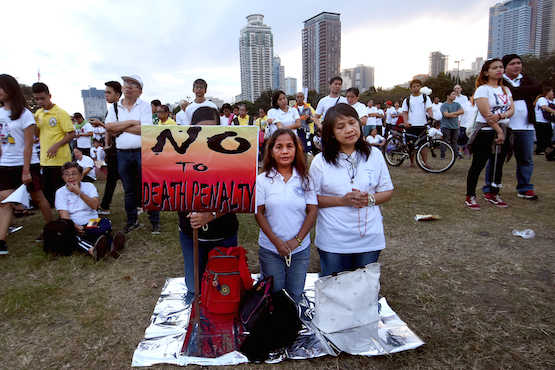
Filipinos join a "Walk for Life" initiated by church groups to dramatize their opposition to what they call "anti-life" policies of the administration of President Rodrigo Duterte. (Photo by Angie de Silva)
The administration of Philippine President Rodrigo Duterte and the country's Catholic church leaders both want change, but they just do not seem to speak a common language and fail to capitalize on commonalities.
That is how some Filipinos perceive the ongoing spat between the country's secular and religious leaders, who fight their battle on traditional and social media.
"[They] are fighting for the same things, but the government believes in achieving it in a different way," said Anthony James Perez, former head of the Filipinos for Life group.
Since taking office last year, Duterte has been at odds with the church hierarchy, especially on issues of drug-related killings, the revival of capital punishment, and the lowering of the age of criminal liability for children.
Perez said he believes the president is voicing the longing of people for justice and security, something church leaders are in favor of.
"But the church is also reminding people that the way toward justice is through the recognition of the sacredness of life, first and foremost," said Perez.
While Filipinos look at the president as a "master communicator," who has a brutal way of speaking his mind, the country's bishops seem to be suffering from a public relations problem.
Perez said church leaders, especially Archbishop Socrates Villegas of Lingayen-Dagupan, president of the bishops' conference, "need a carefully calculated and thought-out messaging system."
For the "pro-life" advocate, the problem is not the content of the message but in discerning "the most effective way of saying what needs to be said and when is the most opportune time to do so."
If the government's reaction to the bishops' series of pastoral statements on killings and the death penalty was a gauge of the country's church-state relations, it can be described as "chilly" if not "antagonistic."
Duterte's statements against the church and its leaders seemed to have emboldened other government officials to level sundry insults at the church.
Presidential spokesman Ernesto Abella, a Protestant pastor who holds a master's degree in Divinity, described the Catholic bishops' conference as "out of touch."
Father Jerome Secillano, executive secretary of the public affairs committee of the bishops, admitted that the church leaders' relationship with the government is "testy."
Both camps do not agree on policy directions to take in addressing some of the most critical problems besetting the country. The relationship is aggravated by Duterte's personal attacks against specific bishops.
"The animosity is actually borne out of misguided impressions that have not been properly discussed and corrected," said Father Secillano.
He said government leaders think that the church is against Duterte, oblivious to the fact that the bishops were not less vocal against abuses during the previous administrations.
Meanwhile, some church people think that the Duterte administration harbors anti-clerical or anti-church sentiments.
"It is not true that the church is against Duterte," said Father Secillano. "I guess it is safe to say that the church is merely critical of issues like human rights, justice, [and] respect for life."
He said the Philippine church has been consistent on its stand on issues affecting people's welfare, but the government perceives it as "meddling in government affairs."
Several surveys have shown that while church leaders admit to negative perceptions of people about church leaders, the church as a whole is still widely trusted.
Recent pronouncements made by Archbishop Villegas that church leaders are supportive of Duterte but not some of his policies can be a beginning of "clear messaging."
It's something that people in the government seemed to have already welcomed.
Nirva'ana Delacruz, a member of the youth group Singles for Christ, has been a Catholic lay missionary to Indonesia and East Timor. She writes occasional articles for various church-run publications in Manila.


